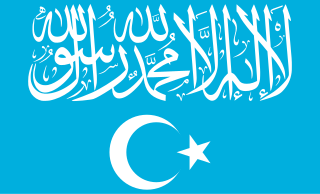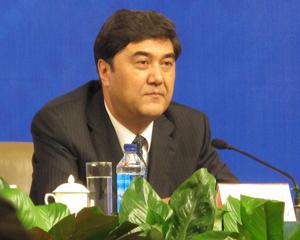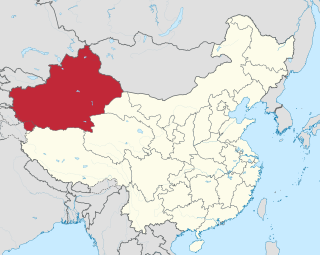Related Research Articles

The Uyghurs, alternatively spelled Uighurs, Uygurs or Uigurs, are a Turkic ethnic group originating from and culturally affiliated with the general region of Central and East Asia. The Uyghurs are recognized as native to the Xinjiang Uyghur Autonomous Region in Northwest China. They are one of China's 55 officially recognized ethnic minorities. The Uyghurs are recognized by the Chinese government as a regional minority and the titular people of Xinjiang.

East Turkestan is a loosely-defined geographical and historical region in the western provinces of the People's Republic of China, which varies in meaning by context and usage. The term was coined in the 19th century by Russian Turkologists, including Nikita Bichurin, who intended the name to replace the common Western term for the region, Chinese Turkestan, which referred to the Tarim Basin in the southwestern part of Xinjiang during the Qing dynasty. The medieval Persian toponym "Turkestan" and its derivatives were used by the local population as early as the 7th century. Historical manuscripts, dating back to the 7th and 9th century, found in the Turpan and Khotan regions show that the name Turkestan was used to describe the region. The opening of the 11th century literary work Kutadgu Bilig by Kara-Khanid statesman Yusuf Khass Hajib also describes the region as Turkestan. Beginning in the 17th century Altishahr which means "Six Cities" in Uyghur became the Uyghur name for Tarim Basin, Uyghurs also called the Tarim Basin "Yettishar," which means "Seven Cities," and even "Sekkizshahr" which means "Eight Cities" in Uyghur. Chinese dynasties from the Han dynasty to Tang dynasty had called an overlapping area the "Western Regions". The parts of this area conquered by Manchu Qing Dynasty were termed "Xinjiang" from the 18th century on.

The Turkistan Islamic Party (TIP) which has often been confused as the East Turkestan Islamic Movement (ETIM) and other names, is a Uyghur Islamic extremist organization founded in Pakistan by Hasan Mahsum. Its stated goals are to establish an Islamic state in Xinjiang and the of entire Central Asia, and eventually a Caliphate The United States removed the "East Turkistan Islamic Movement (ETIM)," which had been confused as the "East Turkistan Islamic Party / Turkistan Islamic Party," from its list of Terrorist Organizations in 2020, claiming it ceased to exist. However, the U.S. State Department later stated that "ETIM was removed from the list because, for more than a decade, there has been no credible evidence that ETIM continues to exist as the same organization that was conducting terrorist attacks in Syria at the time of their designation." The U.S. State Department further stated that "Uyghur terrorists fighting in Syria and Afghanistan are members of the Turkistan Islamic Party (TIP)"and that the TIP is "a separate organization that China and others have incorrectly identified as ETIM."
Ismail Tiliwaldi is a retired Chinese politician of Uyghur heritage. He was the chairman of the Xinjiang Uyghur Autonomous Region, the head of the Xinjiang government, from 2003 to 2007 ,and Vice-Chairman of the Standing Committee of the National People's Congress from 2008 to 2013.

The East Turkestan independence movement is a political movement that seeks the independence of East Turkestan, a large and sparsely-populated region in northwest China, as a nation state for the Uyghur people. The region is currently administered as a province-level subdivision of the People's Republic of China (PRC), under the official name Xinjiang Uygur Autonomous Region (XUAR). The East Turkistan independence movement is primarily led by the East Turkistan Government in Exile and supported by the East Turkistan National Awakening Movement. Within the movement, there is widespread support for the region to be renamed, since "Xinjiang" is seen by independence activists as a colonial name. "East Turkestan" is the best-known proposed name as it is the historical geographic name of the region and the name of the two independent states that briefly existed in the region in the first half of the 20th century.

The January 2007 Xinjiang raid was carried out on January 5, 2007, by Chinese paramilitary police against a suspected East Turkestan Islamic Movement (ETIM) training camp in Akto County in the Pamir plateau.
Terrorism in China refers to the use or threatened use of violence to effect political or ideological change in the People's Republic of China. The definition of terrorism differs among scholars, between international and national bodies and across time and there is no legally binding definition internationally. In the cultural setting of China, the term is relatively new and ambiguous.
Zhang Chunxian is a Chinese politician best known for his term as the Communist Party Secretary of the Xinjiang Uyghur Autonomous Region, and the Political Commissar of the Xinjiang Production and Construction Corps from 2010 to 2016. From 2005 to 2010 he was the Party Secretary of Hunan Province.

Nur Bekri is a former Chinese politician of Uyghur ethnicity, best known for his term as Chairman of the Xinjiang Uyghur Autonomous Region, between 2008 and 2014. Between 2014 and 2018, he was vice-chairman of the National Development and Reform Commission and Director of the National Energy Administration, with rank equivalent of a minister. Bekri was one of the highest ranked ethnic minority officials in the Chinese government.

The World Uyghur Congress (WUC) is an international organization of exiled Uyghur groups that claims to "represent the collective interest of the Uyghur people" both inside and outside of the Xinjiang Uyghur Autonomous Region of the People's Republic of China. The World Uyghur Congress claims to be a nonviolent and peaceful movement that opposes what it considers to be the Chinese "occupation" of 'East Turkestan' and advocates rejection of totalitarianism, religious intolerance and terrorism as an instrument of policy. The Congress is funded in part by the National Endowment for Democracy or NED of the United States. It has been designated as a terrorist organization by China since 2003 for conspiring with separatists and religious extremists to plan terror attacks.

Li Zhi is a former Chinese politician who spent his career in Xinjiang, most notable for his role as the Communist party chief of Ürümqi during the city's rioting in July 2009. He was originally from Lixin, Anhui. He was detained by the authorities for investigation in 2015 and then expelled from the Chinese Communist Party.

Xinjiang, officially the Xinjiang Uygur Autonomous Region (XUAR), is an autonomous region of the People's Republic of China (PRC), located in the northwest of the country at the crossroads of Central Asia and East Asia. Being the largest province-level division of China by area and the 8th-largest country subdivision in the world, Xinjiang spans over 1.6 million square kilometres (620,000 sq mi) and has about 25 million inhabitants. Xinjiang borders the countries of Mongolia, Russia, Kazakhstan, Kyrgyzstan, Tajikistan, Afghanistan, Pakistan and India. The rugged Karakoram, Kunlun and Tian Shan mountain ranges occupy much of Xinjiang's borders, as well as its western and southern regions. The Aksai Chin and Trans-Karakoram Tract regions, both administered by China, are claimed by India. Xinjiang also borders the Tibet Autonomous Region and the provinces of Gansu and Qinghai. The most well-known route of the historic Silk Road ran through the territory from the east to its northwestern border.
On 24 April 2013, ethnic clashes occurred in Marelbeshi (Bachu), Xinjiang, China. The violence left at least 21 people dead, including 15 police and officials.

The Xinjiang conflict, also known as the East Turkistan conflict, Uyghur–Chinese conflict or Sino-East Turkistan conflict, is an ongoing ethnic geopolitical conflict in what is now China's far-northwest autonomous region of Xinjiang also known as East Turkistan. It is centred around the Uyghurs, a Turkic ethnic group who constitute a plurality of the region's population.
On 26 June 2013, rioting broke out in Shanshan County, in the autonomous region of Xinjiang, China. 35 people died in the riots, including 22 civilians, two police officers and eleven attackers.

Ismail Amat was a Chinese politician of Uyghur ethnicity who served as Chairman (Governor) of Xinjiang Uyghur Autonomous Region, State Councillor, Vice-Chairman of the National People's Congress and Vice-Chairman of the Chinese People's Political Consultative Conference (CPPCC).

Uyghur Americans are Americans of Uyghur ethnicity. Most Uyghurs immigrated from Xinjiang, China, to the United States from the late 1980s onwards, with a significant number arriving after July 2009.

The Xinjiang internment camps, officially called vocational education and training centers by the government of China, are internment camps operated by the government of Xinjiang and the Chinese Communist Party Provincial Standing Committee. Human Rights Watch says that they have been used to indoctrinate Uyghurs and other Muslims since 2017 as part of a "people's war on terror", a policy announced in 2014. The camps have been criticized by the governments of many countries and human rights organizations for alleged human rights abuses, including mistreatment, rape, and torture, with some of them alleging genocide. Some 40 countries around the world have called on China to respect the human rights of the Uyghur community, including countries such as Canada, Germany, Turkey, Honduras and Japan. The governments of more than 35 countries have expressed support for China's government.

The Chinese government has committed a series of ongoing human rights abuses against Uyghurs and other ethnic and religious minorities in Xinjiang that is often characterized as genocide. Beginning in 2014, the Chinese government, under the administration of Chinese Communist Party (CCP) General Secretary Xi Jinping, incarcerated more than an estimated one million Turkic Muslims without any legal process in internment camps. Operations from 2016 to 2021 were led by Xinjiang CCP Secretary Chen Quanguo, who dramatically increased the scale and scope of the camps. This is the largest-scale detention of ethnic and religious minorities since World War II. Experts estimate that, since 2017, some sixteen thousand mosques have been razed or damaged, and hundreds of thousands of children have been forcibly separated from their parents and sent to boarding schools.
An Zhengyu is a former Chinese politician who spent his entire career in northwest China's Xinjiang Uygur Autonomous Region. As of July 2022 he was under investigation by China's top anti-corruption agency.
References
- ↑ Wild West China: The Taming of Xinjiang Page 242